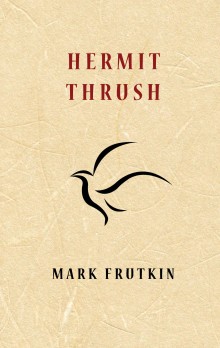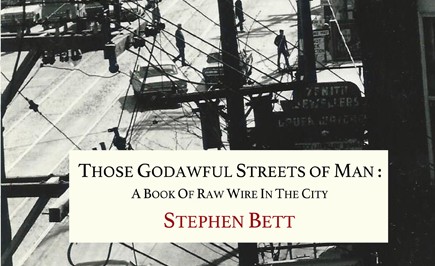Hermit Thrush. Mark Frutkin. Quattro Books. Toronto, Ontario. 2015.

Hermit Thrush is Mark Frutkin's newest poetry offering and it is a quietly astonishing book of poems. Frutkin is giving a master class of sorts, these poems all point in the same direction as though guided by a poetry compass.
My memory isn't what it once was, neither is anything else, but I think a cat named Riley Tench introduced me to Mark Frutkin in the late 70's. A number of "Peterborough Poets" had travelled to Ottawa for a poetry event at Saw Gallery and Mark was our contact, if not the organizer. Point being that I've know Mark Frutkin for over 35 years.
But I don't know him well at all. Yet I could have predicted my reaction to these poems. Solid, solid, solid. Frutkin knows exactly where he wants to go with a poem.
Cathedral of Chartres
Thirty-thousand workers
build a cathedral in silence -
A few sounds linger:
masons tock granite, carts clatter,
men grunt under loaded hods -
but even the warblers cease their singing
A workman sneezes
and those nearby look up -
what a strange and marvelous noise
The consumptives too try
to do their part,
swallowing their coughs
The architect clutches a board
and a knob of charcoal,
quick to sketch
what before was spoken
They all turn at the sound
of thunder approaching
from miles across the plain,
and hear a nearby brook
unable to curb its babbling.
...
Today's book of poetry knows Mark Frutkin well enough to address him by name but we've never shared wine, broken bread. We do know how much we admire these well crafted poems.
Hermit Thrust is spotted with 20 or so almost perfect haiku. You might think Frutkin writes those to amuse himself and tease the gods. Certainly amused us here.
Frutkin has a range of interests and a broad encyclopedic noggin and he applies his vast resources to poems full of guests and wonder. Sung Po-jen and Basho stroll through these pages and rub shoulders with Edith Piaf while she sings to a reflection of Baudelaire. There is even the appearance of a French flaneur which will please my flaneur-friend Lea Dunning very much.
Today's book of poetry is only scratching the guest list surface with this name dropping - what we'd really like to make clear is just how much we enjoyed Frutkin's mature and certain voice. These poems are crystal, clean as a glass.
Life with Artists
for Faith
Stamped on the back of our china -
Van Gogh,
canned soups in the cupboard
by fifteen-minute
Andy Warhol,
still famously wrong
after all these years,
we own a broom and dust pan
likely by Duchamp
The back garden designed
by Monet, the blur
through the fogged-over
windows quite Impressionist
The living room
quietly breathers Edward Hopper
The cumulus clouds in the sky over the house
remind me of Georgia O'Keefe's
monumental mural in New Mexico,
and when I read the newspaper
I keep glimpsing scenes
from Cartier-Bresson
I linger in bed
and stare at the ceiling
etched by Mondrian
Many a room in this house
could have been designed
by the Russian Constructivists
But when I look at your face,
it's pure Leonardo
and I feel dancing inside
like Klee or Kandinsky.
...
Can we say it? These are happy poems. Hermit Thrust is quietly but assertively joyous. You feel good, even uplifted, after reading these intelligent poems. In today's monstrously clusterf**ked mad world it is reassuring to encounter such reasoned and sustained hope. Mark Frutkin's poems call on us to read with our better nature at the forefront. Today's book of poetry believes Hermit Thrush is a contemplative rhapsody on moving forward with hope.
Our morning read in the office today was a gas. Everyone in the room was sporting a big Frutkin smile. We all took turns reading the haiku, Kathryn, our Jr. Editor, led the charge and seemed to have the best handle on them. But they were enjoyed by all.
Listening for Silence
A sliver of wind
slips between the piano key
slats of the fence,
I hear a single leaf
land on the deck
A white butterfly
tracks its erratic path
like traces of thought,
impossible to describe
but linked
Someone closes the door to a shed -
I will go on listening
for silence
until nothing but silence remains.
...
Hermit Thrush was the perfect tonic for Today's book of poetry, it raises the bar on Dagmar. We loved lines like these:
"every blank page is a poem about snow"
Copied several of them into our notebook, jealous admiration coursing our veins. Today's book of poetry could feel something like joy radiating the room.

Mark Frutkin
ABOUT THE AUTHOR
Mark Frutkin, who currently lives in Ottawa with his family, is an author by trade with an interest in the geography of the imagination. He has published a slew of poetry and prose, which have appeared in Canada, the USA, England, Russia, Poland, Holland, South Korea, Turkey and India. In 2007, his novel, Fabrizio’s Return, won the Trillium Award for Best Book in Ontario and the Sunburst Award. In 1988, his novel Atmospheres Apollinaire was short-listed for the Governor General’s Award for Fiction as well as the Trillium Award.
BLURBS
“In Mark Frutkin’s marvellous Hermit Thrush, the words are listening to themselves so acutely that the reader can’t help but listen too. This attentiveness has something to do with precision and something to do with wonder. “A bird outside the window / sounds like it’s / gargling sequins.” Can’t you just hear it! The other senses are treated with equal respect. You can actually see the ineffable from many of these lines, can feel it brushing against your palm, can smell it in the binding of this very book. It’s up to you whether you eat these poems whole or take your time, nibble by nibble.”– Barry Dempster
“Any day you can’t coax a chickadee to land on your palm you can always read a poem by Mark Frutkin and get in touch with a mind that is quick, minimalist, and profound. A person could list the friends and relations of these deft gestures – Basho, Szymborska, Simic, the Zen koan, Ponge – but Frutkin’s voice is wholly its own creature, assured, sly, metaphorically robust, and whimsically intent on undoing the habits of familiarity. These poems are deceptively simple as the button that is “a flying saucer / flitting through a slit / into the next dimension.” Running through them there’s a humour that’s cosmic and domestic, a kettle–and–button wisdom that leaves you open, empty, and grateful.”
– Don McKay
Mark Frutkin
Talkin' Poetry Part II (2011)
video courtesy: Olgajanina
from the film Heard of Poets by Josh Massey and Ben Wallace
quattrobooks.ca
493
DISCLAIMERS
Poems cited here are assumed to be under copyright by the poet and/or publisher. They are shown here for publicity and review purposes. For any other kind of re-use of these poems, please contact the listed publishers for permission.
We here at TBOP are technically deficient and rely on our bashful Milo to fix everything. We received notice from Google that we were using "cookies"
and that for our readers in Europe there had to be notification of the use of those "cookies. Please be aware that TBOP may employ the use of some "cookies" (whatever they are) and you should take that into consideration.













